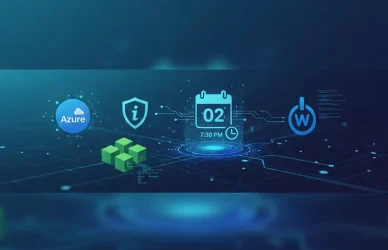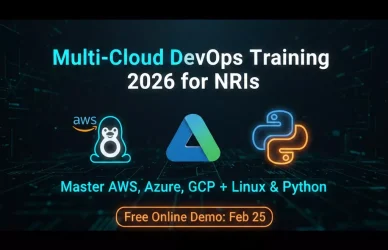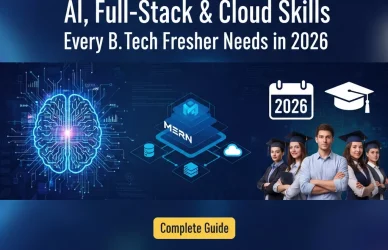In 2025, enterprises are increasingly embracing multi-cloud strategies to boost resilience, prevent vendor lock-in, and enhance performance. This shift demands DevOps professionals who are not only cloud-savvy but also fluent across multiple platforms and cloud-agnostic tools.
If you’re aiming for a DevOps role in this rapidly evolving space, this guide covers the essential technical and soft skills required to succeed in multi-cloud DevOps environments.
What is a Multi-Cloud Environment?
A multi-cloud environment refers to using two or more public cloud platforms (like AWS, Azure, and GCP) simultaneously to meet diverse business needs.
Multi-Cloud vs. Hybrid Cloud
-
Multi-Cloud: Uses multiple public cloud providers (e.g., AWS + GCP).
-
Hybrid Cloud: Mixes public cloud with private cloud or on-prem infrastructure.
Benefits
-
Flexibility to choose best-of-breed services
-
Avoids vendor lock-in
-
Meets regional compliance and ensures high availability
Challenges
-
Complex orchestration across providers
-
Inconsistent APIs, services, and tooling
Why DevOps is Crucial for Multi-Cloud Success
DevOps enables scalable, reliable, and repeatable deployment practices across clouds by:
-
Automating infrastructure provisioning
-
Reducing manual errors
-
Implementing cloud-agnostic CI/CD pipelines
-
Standardizing IaC, monitoring, and rollbacks
Core DevOps Skills for Multi-Cloud Environments
1. Kubernetes
The de facto standard for container orchestration, Kubernetes enables consistent deployment across:
-
AWS EKS
-
Azure AKS
-
Google GKE
Key Skills:
-
Cluster provisioning (
eksctl,az aks,gcloud) -
Helm/Kustomize for configuration
-
Ingress, networking, persistent storage, service mesh
2. Infrastructure as Code (IaC) with Terraform
Terraform allows you to define and provision infrastructure across cloud providers using a single language.
Key Skills:
-
Writing provider-specific modules (AWS, Azure, GCP)
-
Using
terraform workspacefor environment separation -
Managing remote states (S3, Blob, GCS)
-
Secret and backend management
3. CI/CD Pipeline Mastery
Automation pipelines must support diverse deployment targets.
Key Tools:
-
Jenkins, GitHub Actions, GitLab CI/CD
-
AWS CodePipeline, Azure DevOps
-
Canary & blue-green deployments
-
Parallel jobs and matrix builds
4. Cloud Platform Proficiency (AWS, Azure, GCP)
You must understand the core services of each cloud provider.
Key Concepts:
-
IAM policies and RBAC
-
Networking (VPCs, firewalls), compute and storage
-
Services like S3, Azure Functions, BigQuery
-
Billing and cost optimization
5. Monitoring and Observability
Cross-cloud observability is critical.
Key Tools:
-
Prometheus + Grafana
-
Datadog, New Relic
-
Fluentd, Loki, ELK stack
-
OpenTelemetry for tracing
6. Scripting and Automation
Glue code is essential for orchestrating workflows across clouds.
Languages to Learn:
-
Bash: For cloud CLI automation
-
Python: For SDKs and APIs
-
Go: For performant tooling
Use Cases:
-
Triggering serverless functions
-
Automating snapshots and cleanups
-
Cross-cloud cron jobs
7. GitOps and Configuration Management
GitOps manages infrastructure using Git-based workflows.
Key Tools:
-
Argo CD, Flux (for K8s GitOps)
-
Ansible, Chef (for config management)
-
OPA/Rego (for compliance-as-code)
Core Concepts:
-
Git as the single source of truth
-
Automated rollbacks and versioned infra
-
Declarative synchronization
Soft Skills That Make a Difference
DevOps in multi-cloud setups requires:
-
Strong communication across distributed teams
-
Analytical thinking for diagnosing issues across clouds
-
Time management for handling diverse projects
-
Continuous learning to stay ahead of tech evolution
Recommended Certifications
Certifications showcase your multi-cloud readiness:
-
Terraform Associate (HashiCorp)
-
CKA – Certified Kubernetes Administrator
-
AWS DevOps Engineer – Professional
-
Microsoft DevOps Engineer Expert
-
Google Professional DevOps Engineer
Building Experience: Projects and Labs
Hands-on projects can boost your resume and confidence:
-
Deploy a Kubernetes app on AWS EKS and Azure AKS using Terraform
-
Build a CI/CD pipeline deploying to AWS Lambda & Azure Functions
-
Create Prometheus + Grafana dashboards across clouds
-
Manage multi-cloud apps using GitOps (Argo CD)
Share these projects on GitHub or your blog to stand out!
Job Market Trends in 2025
According to clouddevopsjobs.com:
-
Companies favor platform-agnostic DevOps skills
-
Remote-first DevOps roles are on the rise
-
Freelance multi-cloud engineers command premium pay
Multi-cloud fluency is now a competitive edge.
Conclusion
DevOps in a multi-cloud world is the future. By mastering Kubernetes, Terraform, CI/CD, and cross-cloud operations, you position yourself for long-term career success in one of tech’s fastest-growing niches.
Start building projects, earn certifications, and embrace the multi-cloud revolution—your future DevOps job depends on it.
FAQs
1. What’s the difference between hybrid and multi-cloud?
Hybrid = cloud + on-prem. Multi-cloud = 2+ public cloud providers.
2. Can I learn multi-cloud DevOps as a beginner?
Yes. Start with one cloud, then expand using labs and courses.
3. Is Terraform better than CloudFormation for multi-cloud?
Yes, because it supports AWS, Azure, GCP, and more.
4. Which DevOps tools support multi-cloud?
Terraform, Jenkins, GitHub Actions, Kubernetes, Prometheus, and Argo CD.
5. What is the average salary for multi-cloud DevOps engineers in 2025?
$130K–$180K+, depending on location, tools, and certifications.







